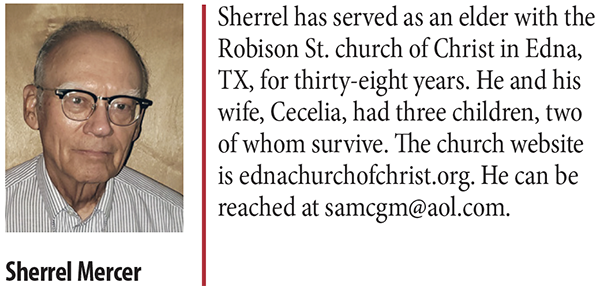by Sherrel Mercer
Synopsis: The interaction between shepherds and an evangelist is governed by divine principles and by common sense as they honor the scriptural instructions for performing their own tasks.
Preach the word; be instant in season, out of season; reprove, rebuke, and exhort with all longsuffering and doctrine (2 Tim. 4:2).
Take heed therefore unto yourselves, and to all the flock over the which the Holy Ghost hath made you overseers, to feed the church of God. . . (Acts 20:28).
With these two exhortations, the apostle Paul defines important continuing activities of a congregation. While these instructions require the interaction of the elders with the evangelist, there are few specific directives in the New Testament which govern the interaction.
The relationship of elders and the evangelist must therefore incorporate by default the lofty principles found in Sacred Scripture, not the least of which is the Golden Rule: “Whatsoever ye would that men should do to you, do ye even so to them” (Matt. 7:12) Common sense and integrity are, of course, also required.
The interaction is overshadowed by the divine imperatives to preach and to save souls. A local congregation is to be a light in its community. The church is the “pillar and ground of the truth” (1 Tim. 3:15). Its unity declares the divinity of Jesus to a dark world. The interaction under the authority of the elders should show a high standard that is recognized by all the members of the congregation. When an evangelist accepts his responsibilities and faithfully discharges them, he is following the scriptural plan.
Proper interaction may be observed in the activities of elders who define the need, method, and subject of the teaching material and “place it on a serving platter,” directing the evangelist to present the material to the congregation. Through this cooperative relationship, they fulfill the divine imperative to feed the flock.
Understanding this interaction should be the starting point of a relationship between an evangelist being considered and an eldership that is seeking. Once an evangelist begins his work, there are more principles that will govern the relationship.
The virtue of patience must be present. Timothy was told to preach “with all longsuffering and doctrine.” The persuading of minds does not often happen overnight, no matter how intent the efforts of the teacher. Likewise, the familiarization with the members required of an evangelist serving well is not an instantaneous occurrence. There is also the patience required by all as the evangelist personally develops. Not every preacher has an orator’s command of the pulpit with his thoughts or vocabulary.
The evangelist and the elders should be capable and informed Bible students. The letters to Timothy and Titus contain much teaching that defines the work of the evangelist. Other key passages in the New Testament also define the work of elders. These tasks are designed to be mutually supportive, not mutually exclusive.
It is imperative that the preaching is supported, as well as the individual preacher. A close relationship between the elders and the evangelist is required. There should be open and regular discussion between both parties from the beginning. This is especially important when discipline of the unruly is considered.
The preacher and his whole family should be invited to come when the work is discussed. Sometimes elders make the mistake of inviting only the evangelist to come on a trip to be considered. Remember that the benefit of having a located preacher is not just to have someone who regularly occupies the pulpit. By virtue of his work environment and flexibility, he and his family can and should choose to be capable ambassadors for truth to the community. His special service to the cause of Christ includes every waking hour, not just some short periods on Sundays and Wednesdays. The needs of the family of the preacher must be openly considered, especially if there are children in the family.
Attention must be given to the need for encouraging the preacher, as well as the need to avoid discouragement. As encouragements, remember that there is special tax treatment of preaching income in the United States. Every effort should be made to facilitate the ability of the preacher to take advantage of those special provisions. Some written documentation to protect him is often necessary.
Elders should willingly serve as mentors to the evangelist. They should encourage his efforts, provide constructive criticism, gently correct errors and misconceptions that may be expressed in a sermon. They must uphold the truth and display unity in the bond of peace. They should also feed him ideas for sermons, and work with him on thorny subjects, all with a goal of properly feeding the flock.
The elders should assure his availability for conducting gospel meetings, and for attending or participating in lectureships, special training sessions, and debates. The resultant encouragement is invaluable. Continuing education is required. A preacher should have other congregations considering his services for a gospel meeting. He should be encouraged to participate in a mutually agreeable number of meetings. The elders, in order to support those efforts, need to always—always—have the ability to replace the preacher in the pulpit and any of his Bible classes when he is gone, even on short notice. Remember that elders are supposed to be apt to teach.
The preacher is a professional, in a proper and positive sense, and should be compensated as such. The choice made by a man to earn his living by preaching the gospel is not to be considered as his taking a vow of poverty. There is no virtue in forcing him to “live on less.” If he honors the scriptural instructions given to preachers, he will be a professional of the finest sort, giving of himself when needed, and always behaving according to the highest standard.
Some preachers are routinely discouraged by elders who wish to count only the time spent in the pulpit to determine how he is paid. When he is out sick, gone to lectures, or holding a meeting, his salary may be cut or suspended. Remember that a preacher’s benefit to the congregation far exceeds the time he spends in the pulpit. Instead, encourage the preacher by establishing his salary on an annual basis, and providing him with monthly earnings during the year. When he is away from the pulpit, his salary continues, and he is free to accept meetings even when his services are unpaid for such efforts. When the preacher cannot preach because of illness, continue his support. He does not need another burden to overcome while recuperating. Remember: Support the preacher as well as preaching.
Sometimes a preacher becomes discouraged by an eldership that seeks to control the hours that he spends in an office and thus restricting his exposure in the community. Such a posture fails to recognize the benefit of a located preacher. Limiting his outside activities can limit his effectiveness.
The elders need to encourage the congregation to give the evangelist their enthusiastic support. No one is perfect, and no preacher will satisfy everyone’s thirst for learning. However, a well-taught congregation will honor the spoken word and the authority of the elders, no matter who occupies the pulpit.
Elders must sometimes conclude that the services of an evangelist are no longer desired. He may not discharge the obligations and expectations that were given to him when he began the work. Recognition of such failures, especially if they cannot be resolved, will cause the elders to take action. The members of a congregation should heartily support the decision of the elders and encourage their efforts to find a capable man to occupy the pulpit. Remember the obligation that God placed on all churches to be the pillar and ground of the truth. A departure needs to be amicable. It does not have to be sudden, secretive, or hostile. Some time may be required for a preacher to locate a new congregation where he can labor. He should not be forced to live on his savings while searching for a place to which to move. Once a new preacher is engaged, the former’s salary should cease, unless there are other mutually agreeable arrangements.
Both the preacher and the elders serve divine appointments that must be honored. Their relationship should be exemplary to all, and the results of the relationship will be positive.


